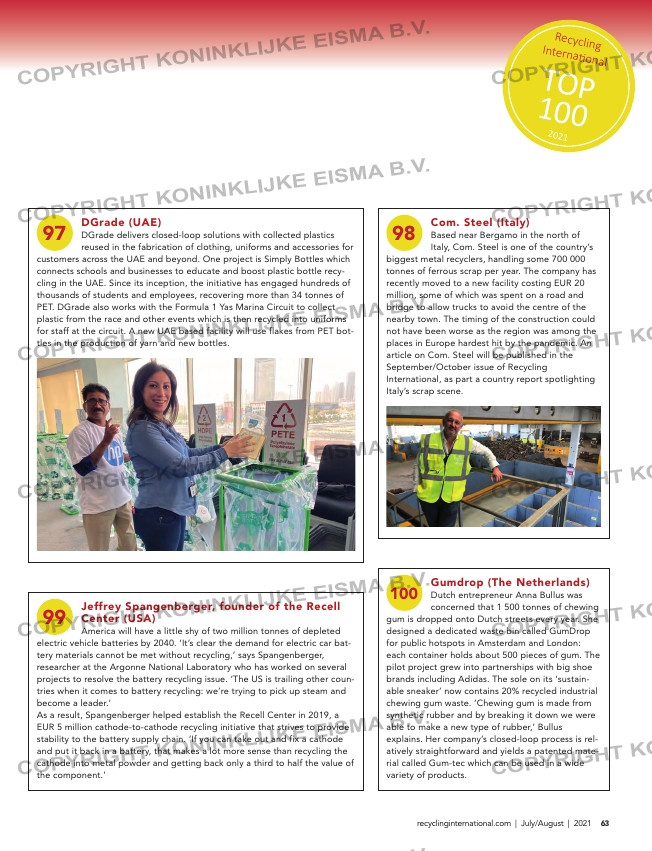Page 63 from: Recycling International July issue | 2021 + TOP 100!

63recyclinginternational.com | July/August | 2021
RecyclingInterna�onal
TOP
100
2021
GBN Artificial Grass Recycling (The
Netherlands)
Faced with a growing volume of discarded synthetic turf sports
pitches, the cry for smart recycling solutions is getting louder. A state-of-
the-art facility near Amsterdam to tackle redundant pitches in the
Netherlands is an initiative from GBN Artificial Grass Recycling which began
operations in 2020. Synthetic turf is processed into high-end products for
reuse in industry and the construction of new sports pitches. The facility
covers part of a 30 000 m2 site and has the capacity to process the 200 syn-
thetic turf sports fields that reach their end of life in the Netherlands every
year.
Com. Steel (Italy)
Based near Bergamo in the north of
Italy, Com. Steel is one of the country’s
biggest metal recyclers, handling some 700 000
tonnes of ferrous scrap per year. The company has
recently moved to a new facility costing EUR 20
million, some of which was spent on a road and
bridge to allow trucks to avoid the centre of the
nearby town. The timing of the construction could
not have been worse as the region was among the
places in Europe hardest hit by the pandemic. An
article on Com. Steel will be published in the
September/October issue of Recycling
International, as part a country report spotlighting
Italy’s scrap scene.
Recyclene Group (Russia)
The only Russian company in the list, Recyclene is a rapidly-grow-
ing specialist in plastics recycling founded and run by Evgeny
Galikhaydarov and Rodin Nikita. Headquartered in Moscow and with subsid-
iary plants in Kaluga and St Petersburg, Recyclene lays claim to a 15-20%
market share for recycled plastics in central Russia.
Galikhaydarov is ambitiously looking to move his business and operations
forward – which in Russia can be quite a challenge. ‘The major problems for
recyclers are the same as for many other private enterprises in Russia:
unpredictable government regulations and pressures, an unstable currency
rate, lack of affordable bank financing,’ he summarised earlier in an inter-
view with RI.
Jeffrey Spangenberger, founder of the Recell
Center (USA)
America will have a little shy of two million tonnes of depleted
electric vehicle batteries by 2040. ‘It’s clear the demand for electric car bat-
tery materials cannot be met without recycling,’ says Spangenberger,
researcher at the Argonne National Laboratory who has worked on several
projects to resolve the battery recycling issue. ‘The US is trailing other coun-
tries when it comes to battery recycling: we’re trying to pick up steam and
become a leader.’
As a result, Spangenberger helped establish the Recell Center in 2019, a
EUR 5 million cathode-to-cathode recycling initiative that strives to provide
stability to the battery supply chain. ‘If you can take out and fix a cathode
and put it back in a battery, that makes a lot more sense than recycling the
cathode into metal powder and getting back only a third to half the value of
the component.’
Gumdrop (The Netherlands)
Dutch entrepreneur Anna Bullus was
concerned that 1 500 tonnes of chewing
gum is dropped onto Dutch streets every year. She
designed a dedicated waste bin called GumDrop
for public hotspots in Amsterdam and London:
each container holds about 500 pieces of gum. The
pilot project grew into partnerships with big shoe
brands including Adidas. The sole on its ‘sustain-
able sneaker’ now contains 20% recycled industrial
chewing gum waste. ‘Chewing gum is made from
synthetic rubber and by breaking it down we were
able to make a new type of rubber,’ Bullus
explains. Her company’s closed-loop process is rel-
atively straightforward and yields a patented mate-
rial called Gum-tec which can be used in a wide
variety of products.
98
99
100
DGrade (UAE)
DGrade delivers closed-loop solutions with collected plastics
reused in the fabrication of clothing, uniforms and accessories for
customers across the UAE and beyond. One project is Simply Bottles which
connects schools and businesses to educate and boost plastic bottle recy-
cling in the UAE. Since its inception, the initiative has engaged hundreds of
thousands of students and employees, recovering more than 34 tonnes of
PET. DGrade also works with the Formula 1 Yas Marina Circuit to collect
plastic from the race and other events which is then recycled into uniforms
for staff at the circuit. A new UAE based facility will use flakes from PET bot-
tles in the production of yarn and new bottles.
97
24-25-26-27-28-29-30-31-32-33-34-36-37-38-39-40-41-45-46-47-48-49-50-51-52-53-54-55-56-57-58-59-60-61-62-63_top100.indd 63 08-07-21 08:57



